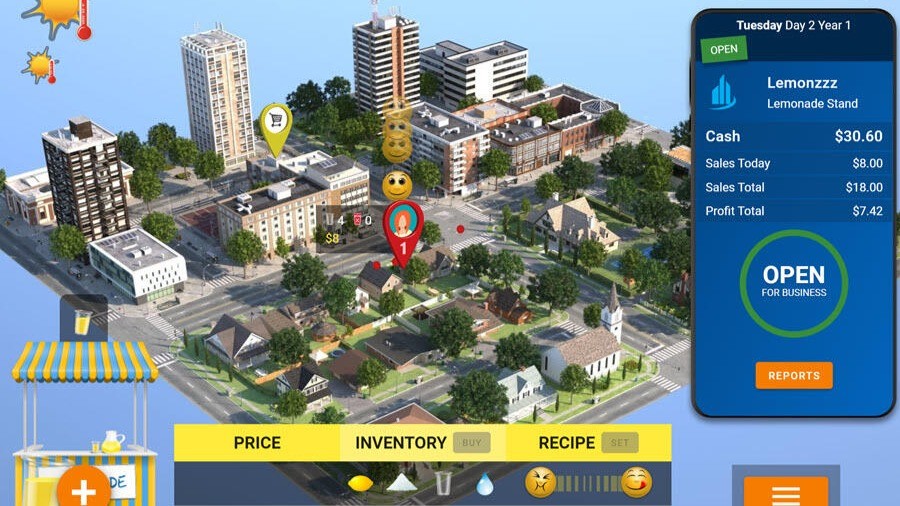
Free Lemonade Stand Game — Discover Powerful Learning
We've made a free version of our popular Lemonade Standsimulation game available for everyone to play at FreeLemonadeStandGame.com — no login and nothing to download, just click and play.
Playing this game for just a few minutes will help you discover how amazingly powerful games are for learning and teaching. Allow me to explain ...
A simple explanation of why games and simulations provide powerful learning opportunities
On first look, one might assume that Lemonade Stand is a simple game for kids.
But, on deeper investigation, a powerful learning experience is revealed.
Give it a try and you'll discover how a simple game can provide deep learning that is much more effective than traditional methods. Keep reading to discover how these concepts can be applied to any business process or skill.
Here's how —
The objective of the game is to make as much money as quickly as possible. To do so you must price your lemonade, determine its quality (sweet and lemony is best!), and order enough inventory to make it — lemons, sugar, water, and cups.
Quality is a challenge because the tastier the lemonade the more it costs to make, which affects your pricing. It also affects your inventory because a tastier drink requires more lemons and sugar.
The weather is also a factor. Lemonade sells better on hot and sunny days, and not so well on cold and stormy days. The weather, of course, is unpredictable and the forecast is often wrong.
You must forecast how many sales you will make in order to purchase just enough inventory to match demand for the day. Purchase too much and it risks spoiling for damage. Don't purchase enough and you miss sales.
Every decision has a consequence. And, your performance is tracked and evaluated continually.
Stop and Reflect
After you play the Lemonade Stand game for a few simulation days, stop for a moment to reflect on everything you have done.
Consider how you have directly experienced product pricing, quality, inventory management, forecasting, cash flow, profit, and more. All in a matter of minutes. And it all made sense because you were doing it in a real-world context.
No Comparison
You could try to learn all this using traditional learning methods — reading and discussing the issues, and perhaps doing some simple exercises. But, until you run a lemonade stand business, you will never truly experience how all the variables are interconnected.
Gain Years of Experience In Minutes
What might take hours, days, or weeks to learn using traditional methods, can now be learned in minutes inside a simulation. It's the difference between theory and practice. It's what transforms knowledge to wisdom. It's the difference between making costly mistakes in the real world versus hitting the ground running. It's why pilots learn to fly in flight simulators.
Experience is what ultimately changes behavior and improves performance.
Now, let's take it to another level.
We can open a second Lemonade Stand and employ someone to run it. Employee behavior can be modeled so they act like people do in the real world. You have to manage them well in order to succeed. How much will you pay them? Will they show up on time? Will they show up at all? How productive will they be?
We can take it even further by adding other businesses that you must compete with in the simulation. Now you have to consider the pricing and quality offered by your competitors and how you stack up.
Imagine if those competitors are not run by the computer, but are your classmates or coworkers — across the hall or around the world. Now, you have another level of engagement — healthy competition.
Oh, and did you notice that this is fun too? Did you also notice that there isn't a lot of reading? It's all about doing, and very visual. Visual means it can transcend literacy, language, cultural, and other common challenges.
Versatile
Your business doesn't sell lemonade? That's ok. Any business process or skill can be simulated: sales conversations with customers, risk management challenges, customer service interactions, high-risk situations, and more.
And it doesn't have to be with software. Card games, board games, and tabletop games can be just as effective.
Want More Examples?
For personal learning, check out GoVentureGames.com
For educators, check out GoVenture.net
All Games Are Educational
Whether you are flinging angry birds, shooting aliens, or leading a guild into battle, our brains our learning. The only question is how transferrable is this new knowledge and skill? Read this article to find out — All Games are Educational — I'll Prove It With Space Invaders
Receive this newsletter by email —
I'm Mathew Georghiou and I write about how games are transforming education and learning. I also share my experience as an entrepreneur inventing products and designing educational resources used by millions around the world. More about me at Georghiou.com